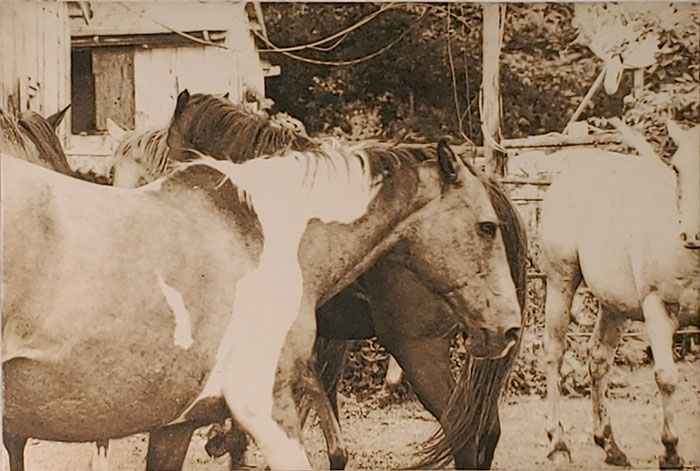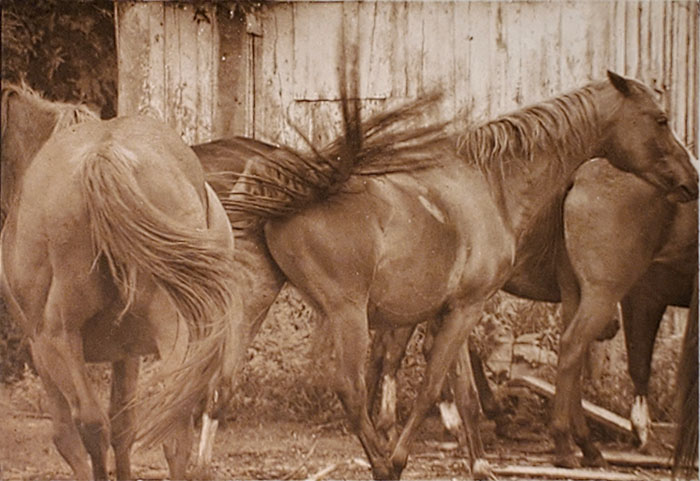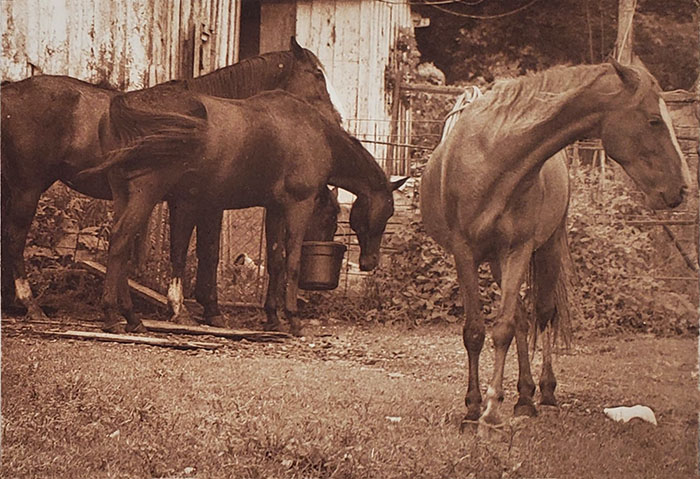Cousin's Horses


Midmorning on July 12, my brother, Tim, eased his pickup out on to old Route 66 making a right hand turn off Bernie Road on the north side of Claremore, Oklahoma. We were on our way to Chelsea just fifteen miles or so northeast.
A day earlier, I had the opportunity to meet an unusual man (my sister-in-law's cousin) when he stopped by their house to drop off a couple of quarts of blackberries that he had picked earlier that morning. These were Oklahoma berries the size of your thumb. He was a square-built man in his early sixties that stood all of five feet one inch to the top of his dark, white-streaked hair. He was noticeably uncomfortable in the room. His eyes darted to each of us continually while drifting between loud outbursts and silence as we talked. He settled somewhere between a mute and Tourette's as I listened to pieces of a story that are still only just beginning to come together in my memory of the experience.
During the visit, my brother explained that 'Cousin' lived on a 100-acre farm where he kept his 16 horses. The man seemed to relax a bit. A little later when I told him that I would like to take some photographs of his horses, he actually softened, mentioning various animals by name and describing their personality differences. Before he left, he paused for a moment and then said that it would be ok to come by and take some pictures—but to be sure to call first and don't call too early. Stopping himself again, he turned to me to explain that he did not get on well with groups or strangers. I assured him that I would come with my brother and we would call first.

Once we reached Chelsea, we took a side road or two and I was informed that we were close to 'Cousin's' place. I asked if we shouldn't call ahead as he had requested but I was assured it would be all right. When we drove through the open gate, you could see a double-wide and the remains of all the things that were no longer of use in the house strewn around the yard. In the field to our left, a number of horses could be seen grazing in waist-high grass. Tim was yelling to announce our arrival when he came around the front of the truck. In a few moments the man appeared at the door sleepy-eyed, bare belly hanging over soiled, slept-in khakis. I imagined that his right hand was resting on the barrel of a leveler action rifle at his side. The moment passed.
The short man moved easily as he coerced animals into the small pen-like area with a grain bucket and some choice words. It was crowded and quick. I think I shot the entire roll of film in about five minutes occasionally dodging some animals and bumped by others, all unconcerned with my presence. The photogravures that you see here were taken from that roll.
On the way home, Tim explained that 'Cousin' was on full disability from Vietnam where he served as a tunnel rat during his stay there. Tim once asked him what it was like down in the tunnels. He told him that it was the only place that he ever felt safe. Above ground in the thick jungle, you could get killed by anybody. Down below, you only had to worry about the enemy.
As we drove back, my thoughts drifted to all those kids in Iraq and the unimaginable excesses of that war experience. One can only wonder if there will still be enough rural countryside and horses to accommodate their re-entry into a fractured afterlife.



E. Thomas Cottrell grew up in Tulsa, Oklahoma in sort of an Horacio Alger ambience. Since leaving the Midwest, he has worked on the Yellowtail Dam in southeastern Montana, in a Silicon Valley semiconductor company, as a program director/teacher for the Oakland Recreation Department, as a facilitator on Buckminster Fuller's San Francisco World Game, and in Washington DC as a political caricature artist in the Watergate Hotel during the Watergate trials. Other educational gigs include degrees from the University of Tulsa and Ohio State and teaching positions at the University of South Dakota and San Francisco State. He currently lives and works in the San Francisco Bay Area.